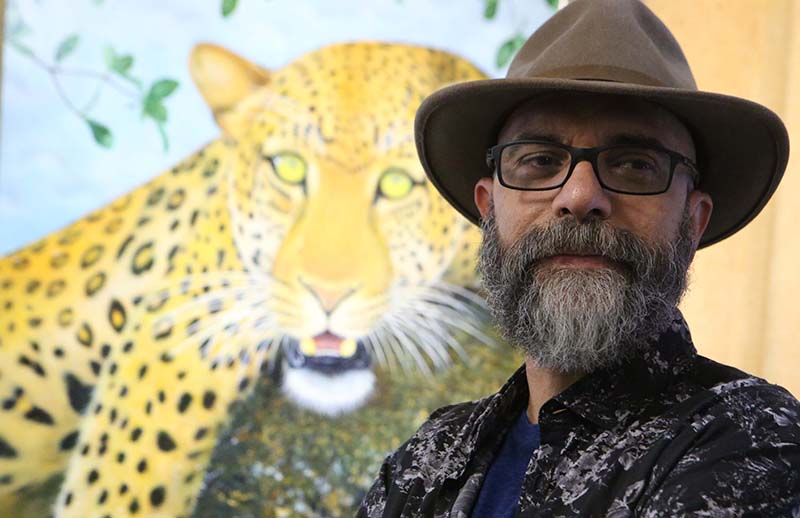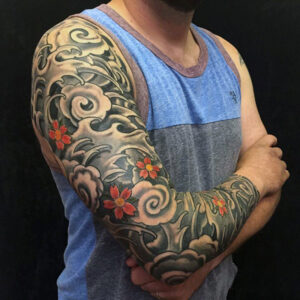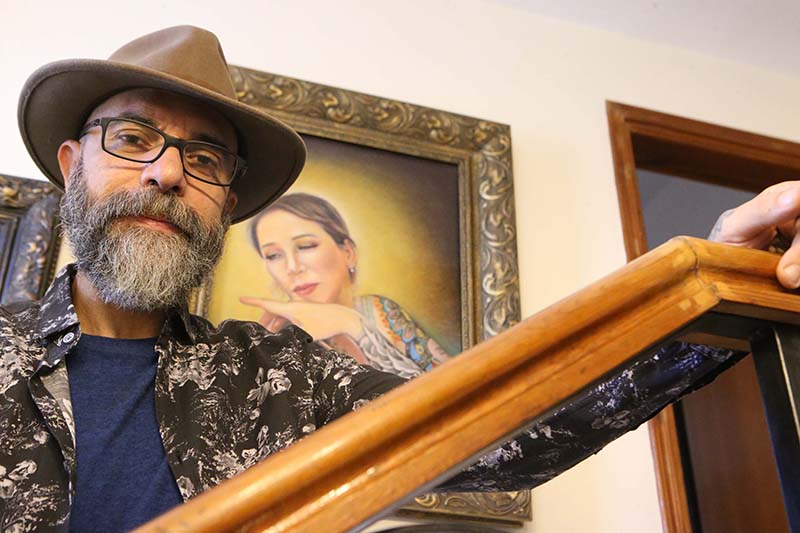In the island’s most famous tattooist THEO PANAYIDES finds an intense, disciplined man dealing in pain all his life, whose vivid artistic style saw him draw in the celebrities in the US
The EB1 green card in the USA is reserved for “aliens who can show that they have risen to the very top of their profession,” according to the website of a law firm that deals in them. EB1s go to artists, scientists, musicians and athletes who, being world-famous, jump the queue, so to speak, and don’t have to follow the usual procedures. Only a couple of thousand are granted each year, and – unsurprisingly, perhaps – only three tattoo artists have ever been allowed in the US on an EB1. One of those three is Paris Pierides, who moved from Cyprus to Charlotte, North Carolina in 2010; by definition, one of the top tattoo artists in the world.
He’d tried before, in 2001, hiring an immigration lawyer on the advice of a fan, and the process was well underway before being scotched by 9/11. He was world-famous even then, having rocked the tattooing world with his vivid, highly artistic images (asked about his influences he cites people like Boris Vallejo, a painter and illustrator – not a tattooist – specialising in fantasy), yet he spent the 00s stuck in Cyprus, with shops in Nicosia and Ayia Napa, caught in a kind of cognitive dissonance. People were flying in from other countries to get tattooed by him – yet here he was dealing with “rude little Cypriot boys who were trying to come in and get tattooed underage, and I was fighting and throwing them out… Then I’m going to the States and people are coming to the [tattoo] convention and camping out the damn entrance, and I’m signing autographs on people – I’m tattooing my autograph on people! And here I’m zero, nothing.”
It’s inevitably something of a bittersweet denouement that he’s now back in Cyprus, having left the States a few months ago – driven away by Covid and other setbacks, plus a certain homesickness for the island (though he didn’t grow up here). Covid restrictions hit tattoo studios especially hard – which makes sense, since tattooing is such an intimate act. It’s not just the physical proximity, it’s also the emotional dynamic of deliberately causing pain to a person, in the name of art. Paris has dealt in pain, professionally speaking, his whole life – which is why it’s such a weird symmetry that the life itself was also full of pain, conflicts and disasters and the unkindness of others. Has he been unusually unlucky? “People say that,” he admits, flanked by his wife Alexandra in their house on the outskirts of Oroklini. “Lot of sadness, a lot of setbacks, yeah… We’ve definitely had some low moments.”
He’s been beaten and assaulted, cheated and threatened and also undermined in more insidious ways. One house (in New York, in his teens) burned down, destroying his portfolio; another (in Charlotte) was battered by Hurricane Florence; even this house, the one we’re sitting in – outside on the covered verandah, with an American-style barbecue in a corner – caught fire a few weeks ago, though the damage was fortunately limited. He’s had surgeries, plus a herniated disc from an accident in his 20s (he’s now 59) that went undiagnosed for 30 years, causing him chronic pain. The real trouble wasn’t accidents or natural disasters, however; it was other people. He must have a pretty cynical view of human nature, I note after he cites yet another instance of someone having let him down. “I do,” he replies, and shakes his head ruefully: “I had to deal with aggressive people – and deep down I’m an artist, a painter… Here I am thrown into the deep end with the sharks, and I’ve got to put the big-boy pants on. And I did.”

photo: Christos Theodorides
That’s the point; it may sound like Paris is a bitter sourpuss – but he actually comes across as a gentle soul, forced by circumstances to ‘put the big-boy pants on’ as he says. “People love him,” says Alexandra (who’s admittedly biased). “He’s funny, he’s generous. People love Paris. He’s not a person who’s going to argue with you, he never argues.” He loves cooking, and classical music, and cats (the couple have three pedigree felines, two Persians and a Ragdoll). He has a dry, very British sense of humour; one of the cats is named ‘Basil’, after Basil Fawlty. He loves making things, and built a “quad electrostatic system” with seven-foot speakers for his old house in Nicosia. There’s surely an alternate universe where Paris Pierides was born somewhere in suburbia, grew up uneventfully, showed his great talent for art and illustration early on, and ended up becoming a painter – but instead he was born in Zambia, went to a hellish boarding school in South Africa (in the mountains of Natal, a place called Botha’s Hill) and eventually became a tattooist because there was money in it, plunged into a world that was still quite rough and inhabited by shady characters.
You might say he’s two people; even his face seems bisected, the top half a little scary – with his shaved head and prominent features – the bottom half cuddly, with a bushy greying beard. His time at boarding school, from the age of 10, tells a story. The place was built on military discipline, “corporal punishment, with cold showers and inspections and beatings on a regular basis”. Bullying was rife. “Being a Greek, you were subject to racism in South Africa… In those days they looked at you and they’d call you a kaffir, they’d call you a wog and a dago. I was bullied a lot – and I became very, very aggressive when I was young, because of being bullied so much.”
His two older brothers were also at boarding school. “My oldest brother just said ‘Punch them’,” recalls Paris, his voice low and even. “‘Soon as they do it, just punch them, knock them out’. So I became super-aggressive, and just took care of business right there and then.” In his last year he was actually separated from the others in the dorm – made to live by himself in the basement – because he was fighting so much; the whole school knew of his reputation. “The young kids used to come to me and say ‘Franzel is bullying me’ – Franzel would be, like, six-foot-three, and I’m just a little guy… [but] I would just jump up and punch them.” Meanwhile he was drawing and painting and sketching, already getting commissions; he painted Zambian president Kenneth Kaunda, then a few years later – still in his teens – got our own Spyros Kyprianou to pose for a portrait.
A lot had happened by then – though nothing to do with tattooing (yet). Paris’ dad, an accountant and entrepreneur, gambled away the family fortune, then died while his son was still at college. A family friend enabled the boy to go to New York (the prestigious Parsons School of Design) on a scholarship – but then the economy “went ballistic in Zambia” and his scholarship collapsed, forcing him to work full-time while also studying to become an illustrator. “I stayed with an aunt originally, my dad’s sister. I think it was six weeks in – and she died in my arms, she had a heart attack and died!”. The trauma was bad enough – but now he had to care for his two younger cousins, in addition to everything else. Then came the aforementioned house fire, leaving him without a portfolio, then he cut his hand with a Stanley knife and was fired for leaving work to go to hospital – and by then he’d had enough. He moved to Cyprus, where his mum had also relocated, though he carefully avoided telling her about his growing interest in tattooing – “because it was taboo in those days”.

Just like at boarding school, Paris reacted. “You sink or swim,” he says, “you have no choice.” He opened his studio, ignoring the threats – then “started winning tattoo conventions, one after the other”. Tattooing was a rough-and-tumble world (it’s more mainstream now, of course), frequented by Hell’s Angels and other tough characters – though it also brought Alexandra, a quiet Russian girl who came by for a tattoo one day. (They were married in 2000.) “I’d been assaulted by drunk British soldiers,” he recalls of those years, “I had been beaten up by an American guy” – but he’d also developed a technique, having tinkered for hours with the needles, that was unlike what anyone else was doing (it involves soldering them in a way that allows you to go back to black ink after doing colours); “A miracle from Nicosia,” declared Bob Baxter of Skin & Ink magazine.
Maybe that’s the best way to encapsulate Paris Pierides: as a tinkerer, a craftsman, happy to spend hours building stuff, whether it’s a painting (some of his more recent works hang in the house, including an African leopard in a nod to his heritage), a stereo system or a new tattooing technique. Even now, “he draws all the time,” laughs Alexandra. “I do,” admits her husband, “and my thing is – when I start, I lose track of time… I may go for three days without sleeping!”.
That’s the kind of focus you need for an EB1 green card – but it’s also that he can’t sleep, he explains, when he feels something isn’t right it gnaws at him. Paris is very much a perfectionist, which was also reflected in the shops he ran; there were rules, for staff and even for the customers. Isn’t the customer always right? “No. They’re wrong, 99.9 per cent of the time. Because they’re not educated.” He’d always tell them if they were making a mistake (a tattoo isn’t just a nice design; it has to fit the body), “and if they insisted on doing it, I would cancel the appointment and point them somewhere else”. His studio in Charlotte – where he went as a celebrity tattooist, charging hundreds of dollars – was especially strict. No walk-ins, no drunk or stoned customers, no face tattoos. “We’re not doing swastikas, we’re not doing Hitler portraits… I’m not tattooing someone’s dick. You get it all,” he notes, acknowledging my chuckle. “All those weirdos.”
There’s a strong discipline to Paris (he calls himself “very conservative”), possibly left over from his boarding-school days. There’s also a certain solitude, an introverted quality to his often-obsessive tinkering. “I’m very, very shy,” he admits (he also had a stammer in his younger days, adding to the shyness) – which was partly why he drank very heavily for a good 20 years, sometimes “a bottle of whisky a day, 12 beers for a warm-up”. When he arrived in America – especially the gun-happy South – he applied for a gun permit, he tells me, and began “packing”. One night, coming back from a bar, he and Alexandra were in the parked car when a man ran up (he’d just robbed a shop down the road), pulled a gun on them and ordered them out. Drunk and impetuous, Paris pulled his own gun. They remained in a Mexican stand-off for a few moments then the robber, hearing the cops in pursuit, ran off – but Paris’ life could’ve ended right there and then. He stopped drinking soon after.
That’s the kind of incident that ultimately soured him slightly on the American dream – yet they had a good life there, and of course it’s also that America was the Holy Grail for so long, while he was stewing in Cyprus; what happens now? He’ll be 60 in a few months, which doesn’t help: “It’s a pain in the backside, you know. I wish I was young”. He doesn’t plan to open another shop, then again the past few months have been more than enough of being semi-retired; “I didn’t realise we were going to get so bored so quickly”. He’d like to educate the world about tattooing, he muses, get some more “artistic people” involved. “I would like to do seminars, I’d like to do guest spots. I want to tattoo still, I want to paint… I think I’ve still got something to offer”.
That goes without saying – and he’ll surely keep going, this intense and remarkable man with the great inner strength and sensitive soul: “It hurt me so badly,” sighs Paris at one point, recalling yet another painful memory (specifically being trash-talked by other tattooists who’d opened up around him, riding on his coat-tails). We’ve been chatting for hours as I leave the house, and I’m starving; I drive around seeking sustenance – and there, coincidentally, on the main Dhekelia road, is a small tattoo studio, not five minutes from the master himself. I glance at the place, and smile when I notice their slogan: ‘Enjoy Your Pain’. Brother, you have no idea.







Click here to change your cookie preferences